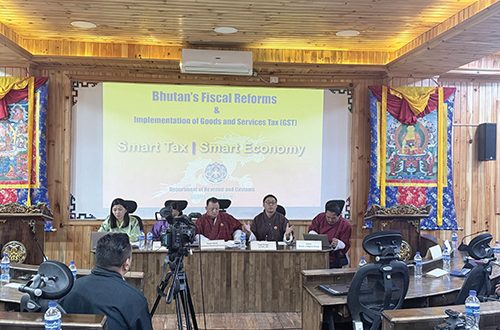Bhutan is proceeding with a major financial overhaul, and preparation for the upcoming implementation of the Goods and Services Tax (GST) and is heavily focused on institutional readiness within the Department of Revenue and Customs (DRC). In alignment with readiness objectives, the DRC has successfully recruited 103 contract employees specifically to support the GST implementation alone.
The institutional capacity building effort included completing three rounds of training for DRC officials across all Regional Revenue and Customs Offices (RRCOs). These staffing and training milestones are critical steps in the DRC’s transition from a mechanical-based institution to a functional and service-oriented organization, a shift intended to improve efficiency and reduce compliance costs for taxpayers.
These measures are being taken ahead of the planned Go Live date of 1st January 2026 for Phase 1 of the implementation.
The introduction of the GST, stemming from the amendment and implementation of the GST Act of Bhutan 2020, marks a national transition from the “inefficient Sales Tax regime” to a “Broad-Based Consumption Tax regime”.
This fiscal reform is comprehensive, extending beyond GST to include overhauling the Income Tax Act of Bhutan 2001 and reforming the Excise regime, all with the goal of making business in Bhutan more efficient and the Bhutanese economy more competitive internationally.
Additionally, the reform includes measures to simplify, harmonize, and modernize customs procedures to reduce trade barriers for domestic producers.
The design of Bhutan’s GST is based on principles of neutrality and efficiency. It is defined as a Destination-Based tax, meaning the tax is collected where the goods or services are consumed.
The GST features a Single Tax Rate structure, currently set at 5 percent from the earlier 7 percent on both goods and services. This contrasts sharply with the previous Sales Tax, which utilized a complex structure involving 16 multiple rates.
Registration threshold includes compulsory registration for businesses with annual turnover of equal to or above Nu 5 million and voluntary registration for businesses with turnover above Nu 2.5 million who may opt in.
The GST applies broadly across all sectors unless specifically exempted, and utilizes an Input Tax Credit (ITC) mechanism where tax is paid only on the value added at each stage of the supply chain.
This design ensures the elimination of the Cascading Effect, thereby reducing the overall tax burden on both businesses and consumers.
Certain goods and services are exempted are basic goods which are limited to rice, oil, salt, sanitary pads and wheelchair. Services as in education and healthcare with specific exclusions.
To promote trade competitiveness, exports are zero-rated on goods and services.
The system will promote transparency, accountability, and taxpayer confidence, while also fostering a Self-Regulating/Self-Reinforcing environment that encourages voluntary compliance and a strong invoicing culture through self-assessment.
To ensure a clear and transparent legal foundation for the new system, the GST Act 2020 has been amended to focus on the minimization of exemptions and the separation of Excise requirements from GST.
The finalized GST Rules, aligned with the amended Act, have been published on both the DRC and Ministry of Finance (MoF) websites for public access.
Furthermore, the government is committed to the automation of tax systems, intending to provide online tax services through platforms such as BITS, eCMS, BIRMS, and PTS.
The deployment of BITS is progressing, with infrastructure scans, security enhancements, and network revamping completed. The ceremonial takeover of BITS from DTL by the DRC is scheduled for 11th November 2025. In addition to internal training for officials, public training remains ongoing across all RRCOs, with over 1,600 business units already trained to familiarize them with the changes.
The DRC is also conducting extensive public awareness and campaigns before the GST rollout.
GST has been implemented by 175 countries around the world.
The global average GST rate is around 15 percent.
 The Bhutanese Leading the way.
The Bhutanese Leading the way.




